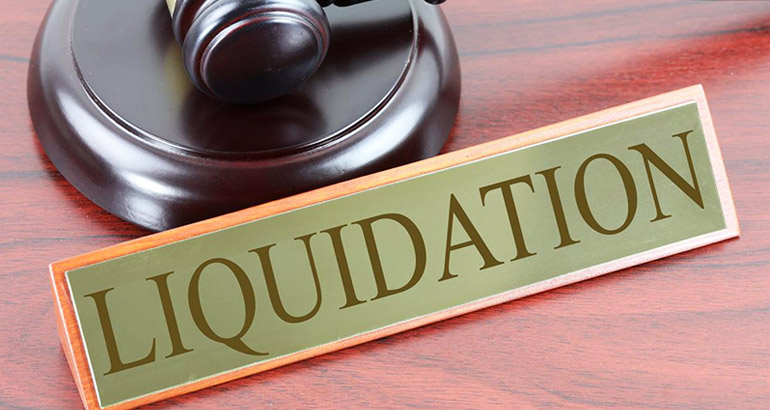Company Liquidation Fundamentals Explained
Company Liquidation Fundamentals Explained
Blog Article
The Ultimate Guide To Company Liquidation
Table of ContentsHow Company Liquidation can Save You Time, Stress, and Money.4 Simple Techniques For Company LiquidationUnknown Facts About Company LiquidationSome Known Factual Statements About Company Liquidation Some Known Facts About Company Liquidation.
A liquidator is especially assigned to oversee the ending up of a firm's events in order for it to be shut down commonly when the company is going insolvent. The liquidator is an unbiased 3rd party who oversees the sale of firm possessions in order to settle any type of arrearages.Their role includes, but is not restricted to: Objective Movie director: A liquidator is entrusted with acting as an impartial 3rd party to look after the entire business liquidation process. Develop Statement of Affairs: Liquidators must create a comprehensive declaration of affairs record. This file is distributed to lenders, describing the present monetary condition of business at the time of its liquidation.
After the liquidation of a firm, its presence is erased from Firms House and it ceases to be a legal entity. If supervisors browsed the procedure uncreative, there would certainly be no charges or personal liability for solid financial debts expected. Currently, with a clean slate, directors can discover brand-new company opportunities, though specialist consultation is suggested.
The Main Principles Of Company Liquidation
As an example, if even more than 90% of all business investors agree, liquidation can take place on short notice within seven days, the minimum legal notice for financial institutions. Normally, the bigger the liquidation and the more assets and funding the business has, the longer the process will certainly take. 'Do I have to pay to liquidate my company?', the solution will depend upon whether your company has any assets leftover when liquidating.

We comprehend that no 2 firms are the very same, which is why we will make the effort to get to know your service so we can advise the best strategy for you. We only operate in your best rate of interests, so you can be entirely confident in the service we supply.
Getting The Company Liquidation To Work
In the UK, there is a set procedure to shutting down or reorganizing a minimal business, whether it is solvent or financially troubled. This procedure is called liquidation and can only be dealt with by a qualified bankruptcy expert (IP) based on the Bankruptcy Act 1986. There are four major kinds of firm liquidation procedure: Lenders' Voluntary Liquidation (CVL); Obligatory liquidation; Administration; and Members' Voluntary Liquidation (MVL).

In these conditions, it is essential that the company ceases trading; if business continues to trade, the supervisors might be held personally responsible and it can result in the bankruptcy practitioner reporting wrongful trading, understood as misfeasance, which may lead to lawsuit. The supervisors appoint an insolvency specialist and as soon as this has been agreed and confirmed, there is a conference with the shareholders.
Of program, if there are no investors, this action of the process is not required (Company Liquidation). The IP takes control of the company and begins the company liquidation procedure. The directors are no longer associated with what occurs, including the sale of the firm's assets. Nevertheless, if the directors desire any of the possessions, they can inform the IP.
Unknown Facts About Company Liquidation
The primary distinction is that the company's creditors used to the court for an ending up order which requires the insolvent business right into a liquidation process. In a lot of situations, financial institutions take this activity as a last resource because they haven't obtained repayment via other types of negotiation. The court appoints an insolvency expert, likewise referred to as an official receiver, to perform the required firm liquidation process.
This sort of business liquidation is not voluntary and supervisors' conduct is reported to the UK's Assistant of State once the liquidation procedure has actually been finished. For that reason, any kind of supervisor that stops working to accept the IP or has actually been entailed in director transgression, or a deceptive act, might result in significant consequences (Company Liquidation).
It is used as a way to safeguard YOURURL.com the firm from any type of lawful activity by its creditors. The supervisors of the company agree to make routine payments to settle their debts over a period of time.
Get This Report on Company Liquidation
This offers the firm with time to develop a plan going forward to rescue the business and prevent liquidation. At this point, directors hand control of the company over to the designated manager. If a business is solvent but the directors and shareholders desire to close the organization, a Members Volunteer Liquidation is the right choice.
The firm liquidation procedure is taken care of by a liquidator assigned by Read Full Report the supervisors and shareholders of the company and they have to authorize a declaration that there are no financial institutions remaining. The liquidation procedure for an MVL resembles that of a CVL because possessions are realised however the profits are dispersed to the directors and the shareholders of the business after the liquidator's fees have been paid.
Report this page